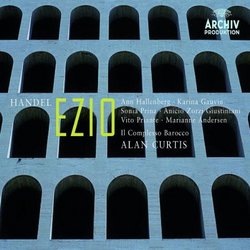Another Wonderful Handel First
Paul Van de Water | Virginia, USA | 05/14/2009
(5 out of 5 stars)
"Ezio has long deserved a first-class recording, and Alan Curtis gives it to us, as he has with so many other neglected Handel operas. Now professor emeritus of musicology at Berkeley, Curtis helped kick off the Handel renaissance with his complete recording of Admeto Handel - Admeto / Jacobs, Yakar, Bowman, Dams, Cold, Gomez, van Egmond, Il Complesso Barocco, A. Curtis for EMI in 1977. That recording, which is still available on Virgin CD, starred Rene Jacobs, James Bowman, Max van Egmond, and other pioneers in historically informed performance. The band was Il Complesso Barocco, then comprised primarily of Dutch musicians.
Curtis didn't record any more Handel operas for many years afterwards, but recently he has more than made up for lost time. From his base near Florence, Curtis has reconstituted Il Complesso Barocco as a largely Italian ensemble. Since 1999, they have produced CDs of Alcina Handel: Alcina, Arminio, Berenice, Deidamia, Fernando, Floridante, Lotario, Radamisto, Rodelinda, Rodrigo, and Tolomeo and a fine DVD of Arioidante Handel - Ariodante / Hallenberg, Cherici, Vandoni Iorio, Nesi, Lepore, Stains, Prato, Il Compresso Brocco, Curtis, Pascoe (Spoleto Festival 2007). Many of these are first recordings, and several have won awards.
Here Curtis assembles another outstanding vocal cast. Swedish mezzo Ann Hallenberg (Ezio) took the title roles in Curtis's Ariodante and Tolomeo and has recorded many other Baroque works. Canadian soprano Karina Gauvin (Fulvia) has excelled in Alcina and Tolomeo under Curtis and has made an outstanding disc of Handel's cantata Apollo e Dafne with Les Violons du Roy. Italian contralto Sonia Prina (Valentiniano) also has a long discography. The other singers are less well known but hold their own in this stellar line-up.
The libretto, after Metastasio's Ezio, draws on the historical rivalry between emperor Valentinian and his general Flavius Aetius (Ezio), who defeated Attila and saved Rome from the Huns. The evil patrician Massimo attempts to frame Ezio for treason, but after some complicated twists and turns, the opera concludes with the requisite liete fine (happy ending). Gramophone's reviewer describes the work as "an excellent and much-need first recording" of "a fascinating, serious dramatic opera," and it's an Editor's Choice for June 2009. The Times (London) writes, "The drama sizzles and the arias ravish the ear." The accolades are fully deserved."


 Track Listings (22) - Disc #1
Track Listings (22) - Disc #1